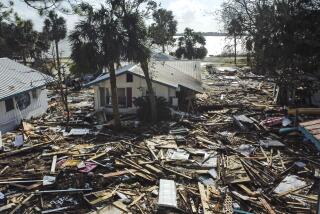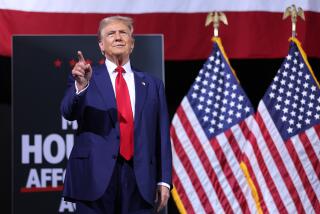Perry and Romney square off in Reagan Library debate
From the moment that Rick Perry and Mitt Romney became locked in combat early during the debate at the Reagan Library Wednesday evening, it became clear that the GOP presidential race was entering a new, more puglistic phase, one that is likely to be defined by a battle between its two front-runners.
For Perry, the Texas governor, the debate in Simi Valley, Calif. was for all intents and purposes his debut on the national political stage. And he immediately showed a willingness to slam his chief rival over jobs.
Perry bashed Romney’s job creation record while governor of Massachusetts, saying it failed to match up to his work in the private sector.
“We created more jobs in the last three months in Texas than he created in four years in Massachusetts,” Perry said.
Romney battled back, saying that Perry had taken advantage of a favorable business climate in Texas, including the absence of a state income tax and huge oil and gas reserves, and couldn’t claim credit for creating those circumstances.
“If he tried to say that, why it would be like Al Gore saying he invented the Internet,” Romney said to laughter.
Perry then compared Romney’s jobs record unfavorably to former Massachusetts governor and Democratic presidential candidate Michael Dukakis. Romney fired back, saying Perry’s record paled in comparison to George W. Bush’s while he was governor of Texas.
The game was on, the battle joined.
Rapidly, it became evident that Perry, the newest entrant in the race who zoomed to the top of the polls almost instantly, was the prime target of the evening. At one point, he complained that felt like a “pinata.”
Perry was repeatedly quizzed about his statements, both in a book and on the campaign trail, comparing Social Security to a “Ponzi scheme” and a “failure.”
“Our nominee has to be someone who isn’t committed to aboliosh Social Security, but is committed to saving [it],” Romney said.
For his part, Perry pledged that those currently in line to receive benefits would have nothing to worry about in his administration. But he repeated a past assertion that the program is a “monstrous lie,” because, he said, the fund will not remain solvent for future generations.
“It is a Ponzi scheme to tell our kids that are 25 or 30 years today you’re paying into a program that’s going to be there,” Perry said. ”Anybody that’s for the status quo with Social Security today is involved with a monstrous lie to our kids, and it’s not right.
Perry was also attacked by former Sen. Rick Santorum and others for a Texas program that vaccinated young girls against the human papillomavirus. “At the end of the day, I will always err on the side of saving lives,” he said.
He defended his refusal to recognize carbon emissions as the chief cause of climate change, saying, “the science is not settled on this.”
Perry’s comments came directly after Jon Huntsman, the former Utah governor, criticized Republicans such as Perry for their position on global warming.
“In order for the Republican Party to win, we can’t run from science. We can’t run from mainstream conservative philosophy,” Huntsman said. “By making comments that don’t reflect the reality of the situation, we turn people off.”
The evening proved difficult at times for other contenders beyond Perry and Romney to get a word in edgewise, particularly Rep. Michele Bachmann of Minnesota, who used the first debate two months ago in New Hampshire to catapult herself into the ranks of serious contenders. At times, she seemed almost relegated to the sidelines, but late in the debate, she ripped the Obama administration’s involvement in the Libyan uprising. .
“It was wrong for the president of the United States to go into Libya,” she said.
Huntsman, whose campaign has found little traction, unveiled a more aggressive side, particularly in his attacks on Romney and President Obama, but it wasn’t apparent he had landed a punch. And there was little sign that Rep. Ron Paul of Texas, who continues to fare well in some polls, was any closer to breaking out as a mainstream threat.
For them, and for the other candidates on the stage Wednesday, Santorum, Newt Gingrich and Herman Cain, the evening showed that the challenge ahead may be to stay in the conversation.
Robin Abcarian and Michael A. Memoli contributed to this report.
More to Read
Get the L.A. Times Politics newsletter
Deeply reported insights into legislation, politics and policy from Sacramento, Washington and beyond. In your inbox three times per week.
You may occasionally receive promotional content from the Los Angeles Times.










